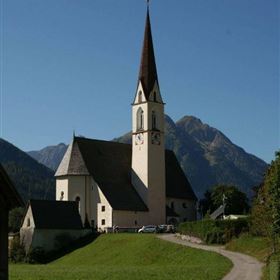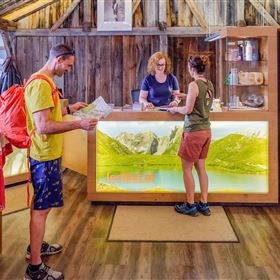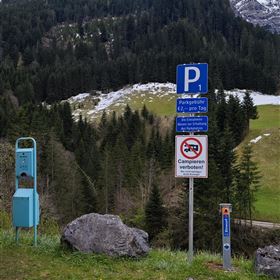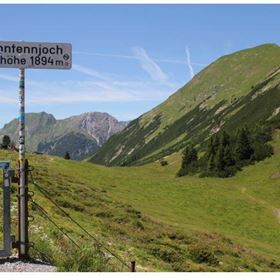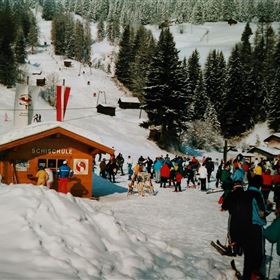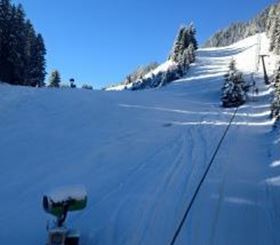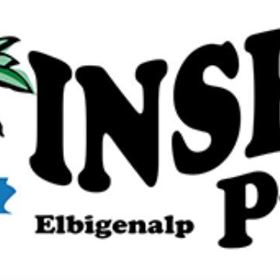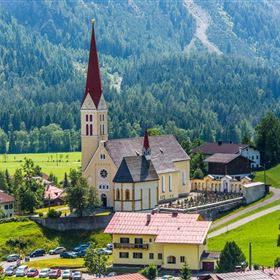Christoph Kammerlander
Christoph "Rissi" Kammerlander is a creative free spirit, artist, musician and Lechtaler from the bottom of his heart. You don't necessarily have to know "Rissi" personally, but his music or one or the other of his song lines has certainly already passed through the auditory canals of many a person. The musical matermind of the Geierwally open-air stage not only writes stage music, but also many a play. In addition, he is also a band member of Lechufer. He gets the inspiration for his songs from every corner in the Lech Valley. But especially at the wild, rushing Alperschonbach he already hears those songs long before they are played up and down the radio.
We talked to Christoph "Rissi" Kammerlander and learned many interesting things about the musical all-rounder.
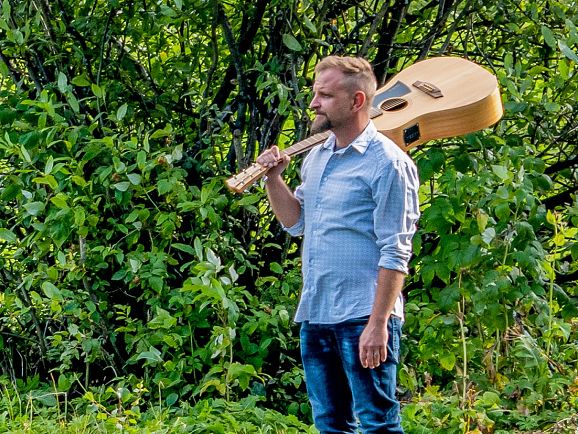
After two so-called theaterless years on the Geierwally open-air stage, you dare to jump on stage again this summer. The play is called "THE RICH LISABETH" and is also written by you. How did you come up with the idea and what fascinates you about the historical figure "Lisabeth"?
Finally, we're all really looking forward to it and there's a real atmosphere of excitement at rehearsals. The whole team is highly motivated. I came up with the idea for the play when I was shown a video of Franz Larcher's village tour from the 1990s. I can only say, a piece of Lechtal contemporary history and also very entertaining. We were just actively looking for historical "material". At such a stage, this village tour was a goldmine and I am almost certain that we will see more about Holzgau on the Geierwallyühne, as steeped in history as this place is.
The knowledge of Elsa Knitel and Eva Wallnöfer and the incredibly detailed Holzgau village chronicle, a book I can recommend to everyone, helped us a lot.
We started writing about 3 years ago, even before Corona, and in retrospect the play has acquired its own topicality. In addition to capitalism, which of course has to be a topic for a moneylender, cholera was raging at the time, which also had to be addressed in the life story of Rich Lisabeth because she was very afraid of it and saw it as God's punishment.
In any case, the fascination of Rich Elizabeth was her big heart. It was also important to the historians that this should come across, because Rich Lisabeth is a figure that until a generation ago was very much anchored in the minds of the Lechtalers as a symbol of benevolence. Slowly she threatened to fall into oblivion. So it is important that her character is also portrayed correctly.
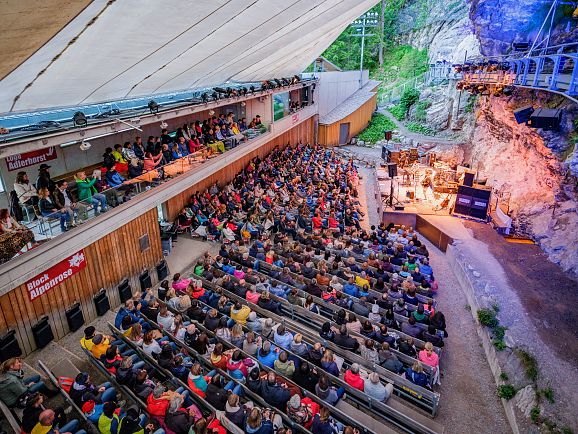
You are not only an author but also a musician and have been writing incidental music for the Geierwally Freilichtspiele for several years. Can you give us an excerpt from your "works"? For which plays have you produced the music and which one do you remember most?
In 2006 Claudia Lang-Forcher brought me in for the play die wahre Geierwally. Since then I have been allowed to put my stamp on every piece, mostly with Anda Kappeller my sandbox friend and fellow 2er. I always put my heart and soul into it, and adding emotional background music or just sounds to scenes is one of the most beautiful things I get to do. When I am allowed to use it to set my own pieces to music, then I see it as a gift to be allowed to do something like that. That was the case in 2015 with the Totentanz, in 2018 with the Lechufer and is the case this year with the rich Lisabeth.
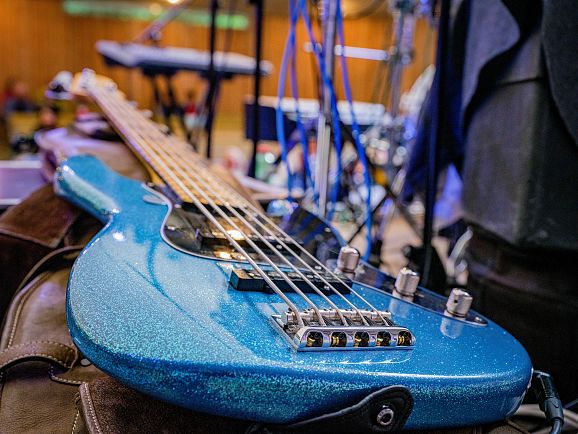
In addition to your involvement with the Geierwally open-air stage, you are also a band member of various "Lechtaler formations" - including Lechufer. Your songs are played daily on the radio - do they also (partly) come from your pen? Or is there a very clear division of who does what and/or can do it better?
The basic idea of many Lechufer songs comes from me. That's how it started back then with the musical, from which this formation was founded. I had to inspire Elias and Celina with a few songs for the project, on the other hand Bernhard with the idea for the piece. It is still exciting for me today when I present this basic idea to them. Elias understands how to bring my compositions, which often taste a bit like the 80s, 90s, into the new era, and then Celina and I don't have much say in the production, which is just as well. Celina knows how to get to the heart of my often far too complicated lyrics in three words. Basic ideas are also her great strength. I remember how she once said during a very cozy evening: "Knoub, mir miaßa mal a Liead übers "Zfrieda sei" schreiba."
Can you describe how a song is created? What is your "approach"?
Different! Often there is only one line that feels good, and then you spin a lyric around it. Every now and then it happens that something touches me very much, so sometimes you take the guitar in your hand and play the song as if it had always been there. And then there are also the songs that we start in twos or threes. Here there is always a discussion about the theme first, then when this is found, it often goes very quickly. Once we rented a place on m Kasermandl for three days. There we created "A Tropfa Ewigkeit".
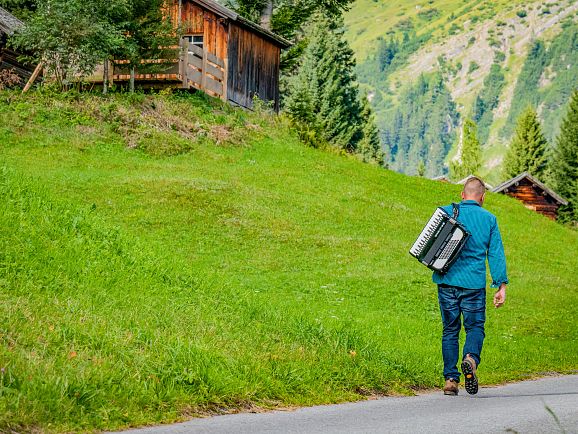
You are deeply rooted in the Lech Valley - the valley is your home. What connects you with the Lech Valley and why do you like being "Dahoam" here so much?
The most beautiful thing about the Lech Valley is that it is so underestimated from the outside. For someone from Innsbruck, it is at least three times as far to drive to the Lech Valley than the other way around. Nevertheless, we manage to attract around 10,000 visitors to the Geirwally stage almost every year, which is something someone in Tyrol should try to imitate. We have slept through the tourism boom for decades and have not mutated into an alpine ballerina, but have been using this for some time to offer something that many no longer have. Unspoiled, unique nature. That is already a point why I am so rooted here and "gera Dahoam". Then, of course, there are the people who have accompanied me all my life. Besides my family, most of my childhood friends are here, with whom I went to kindergarten and with whom I still have a deep friendship. Where else do you have that! Besides all this, the Lech Valley also offers me the opportunity to do professionally what I like to do best. And that again with friends and not in some swollen apparatus with artificial airs. "Because so be me Lechtlar it."
It is a joy to see one's own children grow up in the Lechtal. So carefree this will be possible only in a few parts of the world. I love this valley, since I can think, it was never an option to live somewhere else.
Where do you get your inspiration and ideas? Where/how do you draw new strength for yourself and where/how do you find relaxation?
When it comes to theater, I am actively interested in the history of Lechtal and I want to tell people something about our history that they didn't know yet. If I come across such a circumstance, then the cog already starts to turn. My wife Simone is often my "first instance" as I call her. Since we share a love of theater and music, she never tires of listening to me and often opens up a completely different perspective or even says that something is not a good idea. The next step is then to call Berny (note: Bernhard Wolf). Or he calls with an idea. Once the first seed is planted and you feel that it's good, it grows almost by itself and in countless nights the story is spun out by the two of us until the writing process begins. That can sometimes be over a year just discussing. I find a lot of inspiration in nature at the brook behind my house. There I sit a lot with the guitar or the laptop. Movies and music of other artists and art in general inspire me very often to my own. Or just other people. Schnully (Ernst "Schnully" Schnöller > here a little story about him) is for example such a guy.
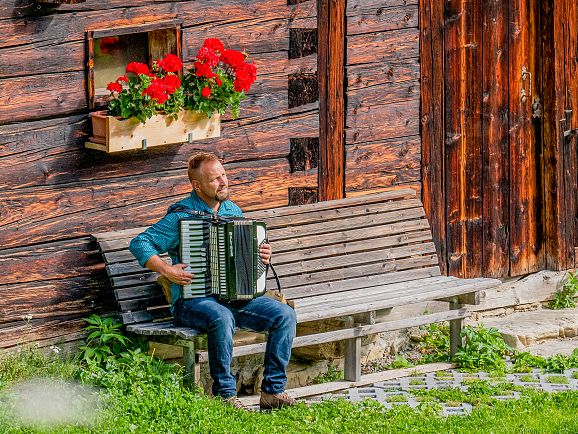
If your "Dahoam" inspires you, how would you describe in words "sounds" and "vibrates" the Lechtal?
I grew up with the sound of the Alperschonerbach. For a long time, it was strange for me to sleep somewhere where I couldn't hear it. And even today, as I said, I often go to the brook behind my house and recharge my batteries. I am not an esoteric, but somehow I seem to need this sound.
What are your hobbies? Where do you find your balance?
Since my hobby became a part of my job at some point, I wanted to find something and started beekeeping a few years ago, which I really enjoy and can also practice again at my beloved Alperschonerbach. I would also describe myself as a fanatical movie fan and I love to read. In winter I like to go skiing on the Jöchelspitze and I hope that this year I will be able to get my inner bastard back on the tennis court from time to time. But my biggest and most beautiful hobby is definitely my family.
In your opinion, what are the most important aspects of Lechtal tourism? Where do you see opportunities, possibilities, but also difficulties?
Contrary to the Lechtal habit of always knowing everything better, I would never presume to give an expert opinion on tourism. I am very happy that culture has become an aspect of our valley. I am very grateful for that. As already mentioned, I am also very happy that our nature plays one, if not the main role in our tourism. The Lechweg should really be walked by all locals. I like it very much that so many non-tourism businesses also profit from the Lechweg and that handicrafts and natural products are almost experiencing a boom here. What I find a bit of a shame as a family man is that there is so little on offer for our young people. This is perhaps not directly related to tourism, but a more diverse night gastronomy would certainly not harm it.
von Anja Ginther
May 03, 2023
